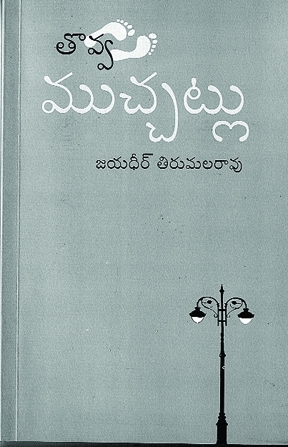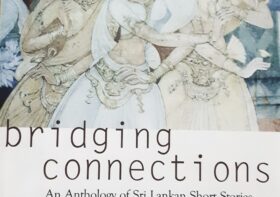తొవ్వ ముచ్చట్లు – జయధీర్ తిరుమల రావు

సంపాదకులు రాసిన వ్యాసములోని ఈ వాక్యము ఈ పుస్తకము దేని గురించో చెప్పకనే చెబుతుంది. “అంతరించిపోతున్న కళల గురించి ఆర్తి , నిరాదరణకు గురవుతున్న దేశీయ సంస్కృతి గురించి – విజ్ఞానం గురించి వెంపర్లాట , మనిషి పట్ల, మానవీయ విలువల పట్ల ఆవేదన – ఈ సమస్త దుఃఖాలకీ కారణమైన వ్యవస్థల పట్ల ఆగ్రహం , మూలాల్ని కాపాడుకోవాలనే ఆరాటం – అందుకు అవసరమైన పనిముట్ల కోసం అన్వేషణ వీటి అన్నిటికి తొవ్వ ముచ్చట్ల ప్రత్యక్షరం సాక్ష్యం” . ఈ పుస్తకం గురించి ఒక్క వాక్యములో చెప్పాల్సి వస్తే ఇంతకంటే బాగా నేను చెప్పగలిగేది ఇంకేమీ లేదు. అయితే ఒక వాక్యముతో మనము ఊరుకోము కదా! ఇంకా పంచుకోవాలి అని అనిపించిన విషయాలు కొన్ని ఉన్నాయి. వాటి గురించే ఈ పరిచయం.
డక్కలి పండిత పౌరాణికుడు అయిన పరిగికి చెందిన డక్కలి రంగయ్య గురించి ఒక వ్యా
తెరచీరలవారు అన్న ఒక కులం కళాకారుల గురించి ఒక వ్యాసము. నేను ఆ పేరు వినటము అదే మొదలు.“మనం మరచిన సంగీత సంపద” అని మరొక వ్యాసము. చావు ఊరేగింపుల చుట్టూతా అల్లుకుపోయిన సంగీత సంస్కృతిని ప్రస్తావిస్తూ “తంబూరంతో శారదాగాళ్ళు, కొమ్ముబూరలతో కొమ్ములవాళ్ళు , ఒగ్గు డోళ్ళతో ఒగ్గువారు, గంటలతో గోత్రాలవారు కాటిపాపలు మృతుడి మంచిని నలుగురికి గుర్తు చేసి తమ జీవనభృతిని స్వీకరించి వెళ్ళేవారు” అని అంటూ “ఇవ్వాళ రాజధానిలో చావు ఊరేగింపుకి పోలీసుల పర్మిషన్ కావాలి. వాహనాల శబ్దం, హారన్ల మోతలు మనిషికి ఎంతటి చికాకు కలిగిస్తున్నవో ఎవరైనా పరిశీలించారా” అని ప్రశ్నించారు. నిజమే. చావు ఊరే
“కతలు పోయె. రాత పుస్తకాలు కాలె” అన్న వ్యాసంలో “ఇవ్వాళ సృష్టించలేనితనం పెరిగింది” అని అంటూ “సాహిత్య కళారంగాలు యే మాత్రమైనా భూస్వామ్యము లోనే వర్ధిల్లాయి . ఆధునికత అభివృద్ధి పేరున పెట్టుబడిదారి సమాజం దానిని ఒక్కొక్క దానినే నిర్మూలిస్తున్నది. కొత్తదానిని దేనిని నిర్మించట్లేదు. నిర్మించే కౌశలం కూడా ధ్వంసించబడింది” అని అన్నారు తిరుమలరావు గారు. ఆయన బహుశా ఈ ప్రభావంతో అన్నారు ఏమో నాకు తెలియదు. ఇన్ని తెలిసిన ఆయన కూడా “భూస్వామ్యము” అన్న ఒక్క పదంలో సంప్రదాయ వ్యవస్థని క్లాసిఫై చేసేస్తే ఎలాగో. ఆ విషయం పక్కన పెడితే మనం నిర్మూలించిన కళలు ఎన్నో! మిక్కిలినేని వారి “తెలుగువారి జానపద కళా రూపాలు” పుస్తకం చదివినప్పుడు అనిపించింది నాకు ఇన్ని కళలను నిర్మూలించాము సరే కొత్త ప్రత్యాన్మయాలు ఏవి మరి? అని. ఇండియన్ ఐడల్ , డ్యాన్స్ బేబి డ్యాన్స్ అనుకోవాలా? ఈ వ్యాసము దేవరములుగు కళాకారుల గురించి. చిన్నమ్మ అన్న దేవరములుగు గాయని అన్న మాటలు చదువుతుంటే చాలా బాధ వేసింది. తమ కుటుంబం లోని కళాకారుల చావుని తలుచుకుంటూ “వీళ్ళ చావు గురించి చాలా మందికి తెలియదు. పత్రికల్లోకి వీళ్ళు పడతారా సారూ . మాకేమన్నా ధనమా ఉద్యోగమా! కథ చెప్పటమే మా ధర్మం. డప్పుకొట్టి దరువేస్తూ గొంతెత్తటమే తెలుసు. దయ కలిగినోళ్ళు నాలుగు పైసలిచ్చేటోళ్ళు. కాకపోతే కడుపు నిండా కథ విన్నవాళ్ళ తృప్తిని చూసి మా కడుపు నిండేది . ఉరుకులు పరుగులు. ఈ కాలంలో పాటెవరికి కావాలె. టీవీనే కావాలి. పాడిన పాటలు, ఆడిన ఆటలే సూసి సూసి అలసిపోవాలె” అని అందట చిన్నమ్మ.
జనగాంకి చెందిన కొయ్యబొమ్మల జగన్నాథం గురించి ఒక వ్యాసము. తన పిల్లలకు తన విద్య నేర్పించటం గురించి మాట్లాడుతూ “నేర్పిస్తే ఏమొస్తది. బోరింగు పనులు చేస్తే నాలుగు పైసలొస్తయి. ఆటో నడిపినా చాలు. బువ్వ పెట్టని తల్లి ఎందుకు అంటున్నారు వయసోళ్ళు” అని అన్నాడట. తన కళని తాను కాపాడుకున్నప్పటికీ ఆ భాద్యతను మరో తరంపై మోపలేని అశక్తత అతనిలో ధ్వనించిందట. కళని రేపటికి కొనసాగించటానికి ఇవ్వాళ సమాజం సిద్ధంగా లేదు అని అంటారు రచయిత. ఆయన ఏ ఉద్ధేశంతో అన్నాడో ఏమో కానీ మైక్రోసాప్ట్ అధినేత సత్యా నాదెళ్ళ తను రాసిన లేఖలో అనుకుంటాను “our industry does not respect tradition it only respects innovation” అని అన్నారు. ఎందుకనో ఆ వాక్యం గుర్తుకు వచ్చి మనస్సులో చివుక్కు మనింది. tradition లేకుండా innovation కుదరదు కదా. సరిగమలు tradition అయితే వాటి నుంచి పుట్టే ప్రతీ పాట ఒక innovationయే కదా. నాకు నీ సరిగమలే వద్దుపో నేను ఏదైనా కొత్తగా నేర్చుకుంటా అని అనే తరము నాది. ఇటువంటి కళలు అంతరించిపోయినా మేము పెద్దగా పట్టించుకోము. ఎందుకంటే అది పాత కళ కాబట్టి! primitive కళ కామోసు! అని అనుకుంటాము.
Non Fiction
Spruha Sahiti Samstha
26/06/2013
Paperback
206




వురుపుటూరి శ్రీనివాస్
@ పవన్ సంతోష్
విషాదమే. కాదనను. ఆదరణ కరువయ్యాక, అన్నం పెట్టలేకపోతున్నప్పుడు కళలు, కౌశలాలు ఎంతకాలం మిగిలి ఉంటాయి? కొత్త నైపుణ్యాలు, కొత్త విద్యలు నేర్చుకోక తప్పని పరిస్థితి ఉంది కదా ఇప్పుడు? అంత బాగా చెప్పలేకపోతున్నాను కానీ మనం పెట్టుకునే బెంగ వల్ల ప్రయోజనం ఉండదేమో అని అనిపిస్తుంది.
శ్రీనివాస్
పుస్తకం.నెట్
Comment on FB, by Ramarao Kanneganti. Re-sharing it here:
****************************************************************************************
With apologies for writing in English.
I have not read the original book — the review makes it interesting enough to get the book.
A few points that I found interesting:
1. Any society that lasts long creates a set of art forms that enrich that society, creates cultural cohesion, and supports the perpetuation of that culture. It is no wonder that the most art forms that we are familar with are the ones that comes from the days of land lords and rural gentry. The industrialization is recent and as such has not given rise to new art forms, yet.
2. With the current rapid changes, since there is a great deal of interaction with the world, there is every temptation to co-opt (or copy) those art forms. That is why reality TV rules; that is why these myriad dance programs rule. And, since they are rooted in different traditions (the traditions where they were originally conceived), they appear alien to us.
3. There is not much point in ranting about hybrid movies. Movies are alien; we tried Indianizing them by fusing with Indian drama. That did not work well, unfortunately. Might as well get with the program and try building a hybrid culture on that foreign medium.
4. Lot of knowledge become irrelevant, unfortunately. For example, my dad would calculate the seasonal wages per person by averaging per day, per acre, per person — all that could easily be done by calculator, or a spread sheet. Our lives are already augmented with modern scientific instruments, starting with electricity. So, some of the things these ancient groups could do are not going to be relevant. It is important that we reinvent what we can do.
5. There is an implicit understanding (which actually I agree with) in the author’s book: the confluence of culture and caste. That is there are certain castes that have been doing certain tasks for years, almost making it an art form. Are we throwing the baby with the bath water by not acknowledging the role of caste? Or, disallowing people to take pride in their caste?
Anyways, there are two other books that I find relevant related to this topic:
http://www.bartleby.com/200/sw4.html — Tradition and Individual talent. The conflict between traditions and innovation. Written the traditionalist Eliot, who was the epitome of modernism.
http://www.amazon.com/Collapse-Societies…/dp/0143117009 — There is a discussion about caste system, professions, industrialization. I am not going to spoil the fun by telling you who the murderer is .
Halley
Thanks for the book references .. will check them out.
Am glad you spoke about the role of technology. One of the topics that continue to interest me is the history and philosophy of technology. This book has been lying on my to-read list from some time. I think it is a fantastic work. Do check this if you haven’t already – http://en.wikipedia.org/wiki/Technics_and_Civilization
వురుపుటూరి శ్రీనివాస్
హేలీ,
ఇది రాసింది మీరే అనుకుంటాను.
చావు పాటల గురించి చదివినప్పుడు నేను ఇటీవలే చూసిన అంత్యక్రియల సంఘటన ఒకటి జ్ఞాపకం వచ్చింది. గంగిరెద్దుల వాళ్ళు వచ్చారు. ఆ ఇంటిముందున్న స్థలంలో అంతా గుండ్రంగా నిలబడితే, నడుమన గంగిరెద్దూ, దాన్ని నడిపించే వాడు, గంగిరెద్దు దవడల మధ్య మెడకాయనిరికించి శవంలా వేలాడే మరొకతను… ఓ పదిహేన్నిమిషాల పాటు చూసి ఉంటానేమో… కులం పేర్లూ అవీ తెలియవు కానీ దహన సమయంలో ఇంకెవరో వచ్చి, పోయినవారి గురించి మంచిమాటలు పాటలాగా చెప్పారు. అదంతా కొత్త, నగరాల్లో ముప్పావు జీవితం గడిపిన నాకు. అదంతా చూసినప్పుడు ఆశ్చర్యం కలిగింది. I was just an outsider looking on, curiously.
ఇవన్నీ వెళ్ళిపోతాయంటే నాకేమీ నాస్టాల్జిక్ బాధ కలగదు. విచ్ఛినమవుతున్న పాత వ్యవస్థలోని మనుషులు కొత్త తీరులకి అలవాటవలేక నలిగిపోతారేమోనన్న బాధ ఉంటుందంతే. కొత్త వ్యవస్థలు రూపొందని దశ గురించి ప్రస్తావించారు మీరు. సంధి దశ. ఎంతకాలం ఉంటుందో! కానీ కాలం మళ్ళీ వెనక్కి వెళ్ళదు కదా…
శ్రీనివాస్
Purnima
అవును ఆర్టికల్ రాసింది హేలీనే. నేను చేసిన పొరపాటువల్ల పేరు కనిపించలేదు. – పూర్ణిమ
pavan santhosh surampudi
మూలాలుగా కాదు సరికదా కనీసం ప్రదర్శనశాలలోని వస్తువులుగా కూడా అవి మిగలకుండా వెళ్ళిపోవడం నిజంగా విషాదం కాదంటారా?
Halley
వురుపుటూరి శ్రీనివాస్ గారూ, భలే గుర్తు పట్టారే !
ఇవన్నీ వెళ్ళిపోతాయంటే నాకేమీ నాస్టాల్జిక్ బాధ కలగదు. – మీకు బాధ కలగకపోవచ్చును . బాధ పడే వాళ్ళ పరిస్థితి ఏమిటి? వారికి కొత్త వ్యవస్థ చూపించే ప్రత్యాన్మయం ఏమిటి . “One might see ‘modernisation’ in India as a movement from the context-sensitive to the context-free in all realms: an erosion of contexts, at least in principle” అని రాసారు ఏ.కే.రామానుజం గారు ఒక వ్యాసములో. మనము వదిలించుకొనే ప్రతీ context వెనుకా ఒకటీ లేదా అంతకంటే ఎక్కువ కులాల జీవన చిత్రాలు ఉంటాయి మన దేశం విషయంలో .
మీరు “I was just an outsider looking on” అని అన్నారు, ఆ విషయానికి సరే మీరు దేనికి insider అవుతారు? ఆ ప్రశ్న ఉదయిస్తే అప్పుడు తెలుస్తుంది అనుకుంటాను ఈ “తొవ్వ ముచ్చట్ల” ఘోష అంతాను.
“కొత్త తీరులకి అలవాటవలేక నలిగిపోతారేమోనన్న బాధ” – ఇది survival of the fittest వంటి ఆలోచనల తాలుకా బాధ లాగా ఉన్నది .
“కానీ కాలం మళ్ళీ వెనక్కి వెళ్ళదు కదా…” – కాలం ముందుకి వెళ్తుందా లేదా వెనక్కి ముందుకి వెళ్తూ ఉంటుందా అసలు కాలం స్వరూపం ఏమిటి అన్న ఆలోచనతో మొదలు పెడితే మనము చాలా మార్చుకోవాల్సి వస్తుంది నేటి మన జీవన విధానంలో మన ఆలోచనలలో .